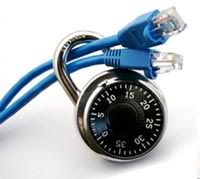|

Previously I wrote about how Lala is using Server DRM to lock their users into a system where they control how music is used. It surprised me that some readers didn't see Lala's service as a form of DRM so I thought I'd ask Lala to describe their system. Maybe if Lala were to publicly admit they use server DRM then the threat would be more clear. Here's Lala describing** how their system uses DRM extensively. (I think this should end the debate of whether Lala uses DRM.)
Q: In my description of the Lala locker system I said you used "Server DRM". Some objected to my description of what you're doing. How do you describe your system?
A: The system provides consumers with access to the digital media from any internet-connected device while enforcing the intended uses by the copyright owners. A network-based DRM system manages digital media assets stored in the network.
Q: So Lala has created something new called "Network DRM"?
A: See patent: Network Based Digital Rights Management System.
Q: Who at Lala gets credit for creating Network DRM?
A: Anselm P. Baird-Smith (Lala co-founder), Vu Nguyen (Lala co-founder & Chairman), Raymond Walsh (Sr. Software Engineer), William A. Alvarado (Lala founder), Zelidrag Hornung (Lala Distinguished Engineer now at Google)
Q: How does Lala's "network-based DRM" compare with previous file based DRM that people are more familiar with like that from Microsoft and Apple?
A: Many Digital Rights Management (DRM) technologies have emerged including Microsoft Windows Media DRM and Apple's Fairplay. These technologies have suffered from a lack of interoperability due to competitive/licensing issues as well as expensive implementation requirements.
Q: So how is Network DRM better?
A: By delivering the product directly from the network, only authorized users and devices can access the media. Access by users and devices is controlled on the web and can be constantly adapted to changing technologies and market pressures.
Q: How is Network DRM good for the content owners?
A: Access to the digital media is controlled by the Digital Rights Management (DRM) process. The DRM process is invoked any time that a user interacts with the managed digital media. The DRM process is capable of computing the permissible uses in real-time, proving real-time control over the assets.
Q: In my article I warned people that with Lala they cannot download their tracks meaning, ultimately, the record labels are in control of their media. Is that accurate?
A: The web restricted nature of the offering means that the digital assets are at all times controlled by the system (versus digital files downloaded to users) and thus result in minimal piracy.
Q: In your system do consumers control their property or do copyright owners, such as record labels and publishers?
A: The system also allows for the "revoking" of ownership of digital media. For example, if a user is known to have illegally shared a file, the copyright owner may choose to revoke their ownership of the digital media in the system, limiting the rights of such user to the media.
There you have it. Lala describing their own system as "network DRM", explaining how "digital assets are at all times controlled by the system", only "authorized devices" are permitted and the record labels can "revoke" content. Moving the locks from individual files to the server is still DRM because the user never owns their media and the rules can change at anytime. Even more concerning Lala readily admits that record labels - their financial backers - are setting the rules. (This is why Lala will not let you listen to your music on a mobile phone.)
At MP3tunes labels don't set the rules you do. You dictate where and how your personal media is used. We don't limit what devices you can use. Instead, we have an open API so that any software program or electronic device can play your music and now video (yes, including on your phone). Already there are many software programs, radios, and even a car device. And, if you don't see something you like, then you're free to build your own interface.
For the last 10 years I have been an opponent of DRM. Open formats and systems are the best for consumers and the best for music sellers to maximize their money. With the labels all selling MP3 I thought the DRM battle was over, but I'm not so sure that's the case. DRM continues to lurk as a hidden threat to rob you of ownership of your tunes. Please give your business to companies which support consumer rights.
**NOTE: I contacted Lala and asked them if they would publicly comment on the above questions and I offered to post their responses unedited on my blog. They did not return multiple calls and emails. The responses above are exact quotes pulled from Lala's patent application to the federal government describing their technology. There's an open offer to Lala to respond to the above questions and I will post their response unedited on this blog.
--MR
michael@michaelrobertson.com
To discuss this topic with others, click here!
The Michael's Minute Meter
 |
|
 |
|
 |
|
 |
 |  | AGREE |
 | DISAGREE |
 | MIXED |
 |  | | Total Votes: 139 |  |
| | |
View the Michael's Minute Meter Report
|